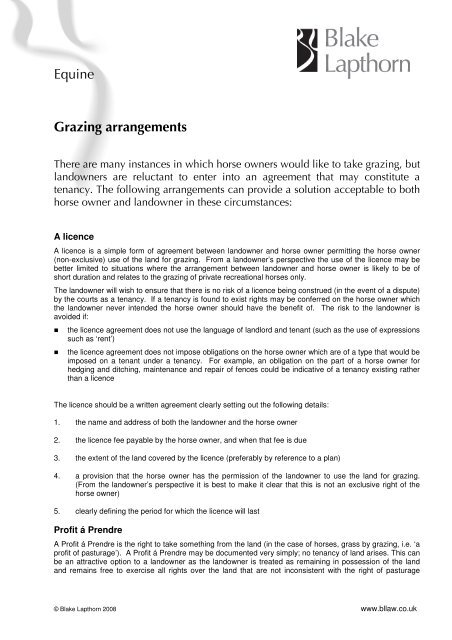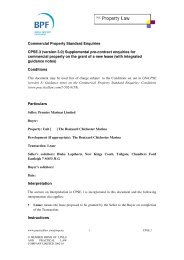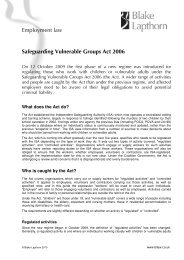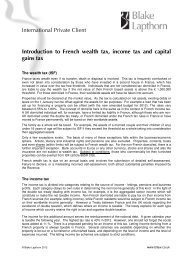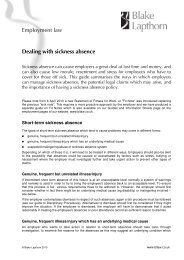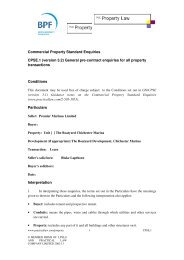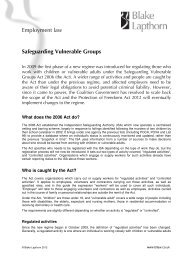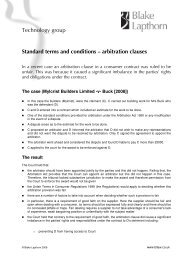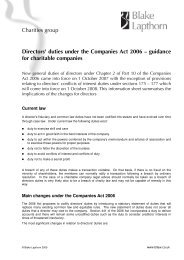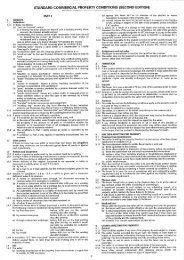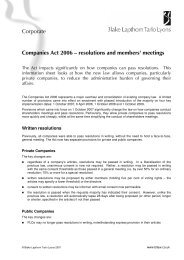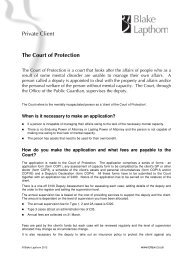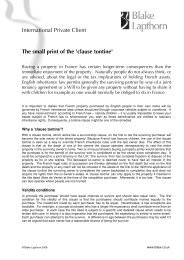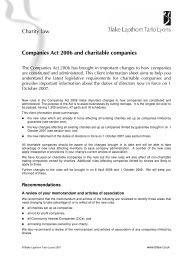Equine Grazing arrangements - Blake Lapthorn
Equine Grazing arrangements - Blake Lapthorn
Equine Grazing arrangements - Blake Lapthorn
You also want an ePaper? Increase the reach of your titles
YUMPU automatically turns print PDFs into web optimized ePapers that Google loves.
<strong>Equine</strong><br />
<strong>Grazing</strong> <strong>arrangements</strong><br />
There are many instances in which horse owners would like to take grazing, but<br />
landowners are reluctant to enter into an agreement that may constitute a<br />
tenancy. The following <strong>arrangements</strong> can provide a solution acceptable to both<br />
horse owner and landowner in these circumstances:<br />
A licence<br />
A licence is a simple form of agreement between landowner and horse owner permitting the horse owner<br />
(non-exclusive) use of the land for grazing. From a landowner’s perspective the use of the licence may be<br />
better limited to situations where the arrangement between landowner and horse owner is likely to be of<br />
short duration and relates to the grazing of private recreational horses only.<br />
The landowner will wish to ensure that there is no risk of a licence being construed (in the event of a dispute)<br />
by the courts as a tenancy. If a tenancy is found to exist rights may be conferred on the horse owner which<br />
the landowner never intended the horse owner should have the benefit of. The risk to the landowner is<br />
avoided if:<br />
<br />
<br />
the licence agreement does not use the language of landlord and tenant (such as the use of expressions<br />
such as ‘rent’)<br />
the licence agreement does not impose obligations on the horse owner which are of a type that would be<br />
imposed on a tenant under a tenancy. For example, an obligation on the part of a horse owner for<br />
hedging and ditching, maintenance and repair of fences could be indicative of a tenancy existing rather<br />
than a licence<br />
The licence should be a written agreement clearly setting out the following details:<br />
1. the name and address of both the landowner and the horse owner<br />
2. the licence fee payable by the horse owner, and when that fee is due<br />
3. the extent of the land covered by the licence (preferably by reference to a plan)<br />
4. a provision that the horse owner has the permission of the landowner to use the land for grazing.<br />
(From the landowner’s perspective it is best to make it clear that this is not an exclusive right of the<br />
horse owner)<br />
5. clearly defining the period for which the licence will last<br />
Profit á Prendre<br />
A Profit á Prendre is the right to take something from the land (in the case of horses, grass by grazing, i.e. ‘a<br />
profit of pasturage’). A Profit á Prendre may be documented very simply; no tenancy of land arises. This can<br />
be an attractive option to a landowner as the landowner is treated as remaining in possession of the land<br />
and remains free to exercise all rights over the land that are not inconsistent with the right of pasturage<br />
© <strong>Blake</strong> <strong>Lapthorn</strong> 2008 www.bllaw.co.uk
granted to the horse owner. Furthermore, landowners would be treated (commonly for tax reasons) as<br />
continuing to farm the land (i.e. by the growing of a crop of grass on the land).<br />
Agistment<br />
This is an agreement whereby a landowner agrees to take in horses to graze on the landowner’s land in<br />
return for a fee. The horse owner attains no tenancy in respect of the landowner’s land and no part of the<br />
landowner’s land is designated specifically for the purposes of the arrangement. Typically under a contract<br />
of agistment the horses are returnable to the horse owner on demand. The landowner will want to provide in<br />
a contract of agistment that he has a lien on the horses until any monies owing under the contract are paid<br />
(failing which the landowner will be entitled to retain a horse or horses until the horse owner has paid his<br />
debt to the landowner).<br />
Contact<br />
For further information or advice, please contact:<br />
Mark Charter E: mark.charter@bllaw.co.uk T: 023 8085 7116<br />
This publication is not a substitute for detailed advice on specific transactions and problems and should not be taken as providing legal<br />
advice on any of the topics discussed.<br />
<strong>Blake</strong> <strong>Lapthorn</strong> uses the information it holds about you to contact you where necessary if (for instance) you have registered to attend a<br />
seminar that we are hosting or have requested information regarding the services that we provide. We will also use it to administer,<br />
support, improve and develop our business and to contact you for your views on our services, as well as to let you know about other<br />
products and services which we offer which may be of interest to you. We may send them by post, telephone or fax, email or SMS. If<br />
you would rather NOT receive further information by any particular format, or at all, or if your details need updating, please contact Dan<br />
Jones on 023 8085 7245 or by email at daniel.jones@bllaw.co.uk<br />
We will not disclose any of your personal identifiable information to any third parties without your express permission to do so, unless<br />
we believe that we should do so to comply with the law.<br />
© <strong>Blake</strong> <strong>Lapthorn</strong> 2008 2


